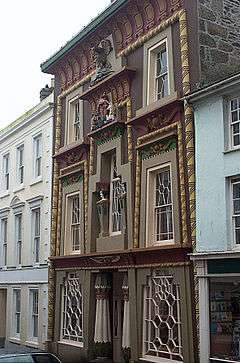Egyptian House, Penzance
| Egyptian House, Penzance | |
|---|---|
 | |
| General information | |
| Location |
Penzance Cornwall |
| Construction started | c 1835 |
| Client | John Lavin |
| Owner | Landmark Trust since 1960s |
| Awards and prizes | Grade I listed building |
| Website | |
| Egyptian House | |
The Egyptian House is a grade I listed building[1] in the Cornish town of Penzance. It is built in the style of Egyptian Revival architecture and has been in the owership of the Landmark Trust since the 1970s. The current building possibly dates from 1835–36.
History
The building is at 6–7 Chapel Street, Penzance. An older building on the site was owned by Richard Hitchens of Madron and later, John Fleming, (described as Perukemaker). The site or building was put up for auction on 3 April 1835 by James Tregarthen, a master mariner of St Mary's, Isles of Scilly and was purchased by John Lavin, a mineralogist of Penzance.[2]
There is some dispute over the architect and the date of build. George Clement Boase (1890) writes that the Egyptian Hall was built by John Lavin, and a deed of 1850 states that he occupied 6–7 Chapel Street and ″... some time since erected and built by him″.[3] Laws (1974) writes that John Foulston of Plymouth may be the architect. Foulston designed the Classical and Mathematical School, Ker Street, Devonport in 1823 which the Penzance building closely resembles. There is an assertion that the Chapel Street building is an exact copy of Peter Robinson's 1811–12 museum in Piccadilly, London, which in not correct.[2] Robinson rebuilt Trelissick the seat of Thomas Daniell in 1824–25.[2]
In his Guide to Penzance, published in 1845, J S Courtney describes the building as .... the astonishing gaudy and eccentric Egyptian House recently built by John Lavin, mineralogist and Egyptologist.[4] In 1878 and 1879, the property is described as ″The Library″ in weekly advertisements in The Cornishman newspaper, and states there is ″a large and complete stock of berlin and other wools, stationery, useful and ornamental articles″.[5] The building was later neglected and in the 1960s hardly noticed. In 1973 scaffolding, which had been erected for several years, was removed to reveal a refurbished building and a new exterior colour scheme of brown and creams.[2] The architect Paul Pearn of Plymouth concluded, that these were the original colours after stripping layers of paint from the elaborate mouldings which were mainly of Coade stone. The building was fully restored under the ownership of the Landmark Trust.[2]
References
- ↑ Historic England. "Egyptian House". National Heritage List for England. Retrieved 7 March 2016.
- 1 2 3 4 5 Laws, Peter. A Review of the Architecture of Penzance. In: Pool, Peter A S (1974). The History of the Town and Borough of Penzance. Penzance: Corporation of Penzance.
- ↑ Boase, George Clement (1890). Collectanea Cornubiensia.
- ↑ Sagar-Fenton, Michael (2015). Penzance The Biography. Stroud: Amberley. p. 169. ISBN 978 1 4456 4263 5.
- ↑ "Trade Announcements". The Cornishman (50). 26 June 1879. p. 2.
Coordinates: 50°07′04″N 5°32′11″W / 50.11788°N 5.53637°W